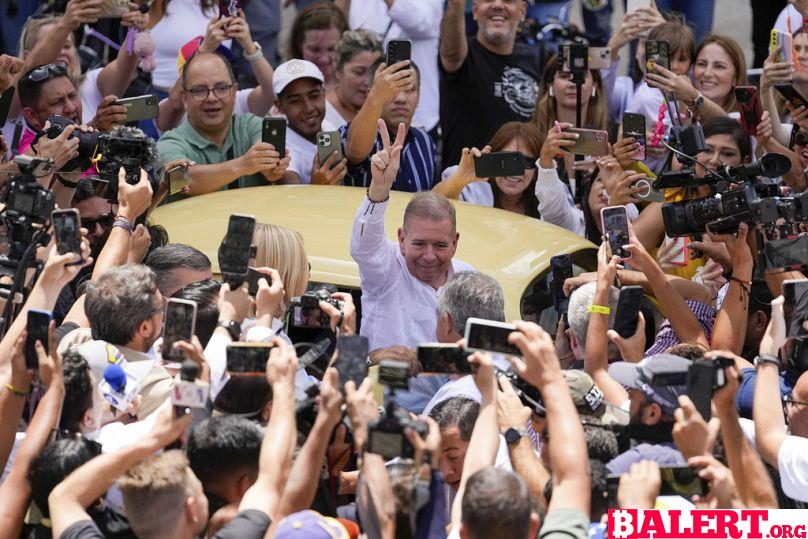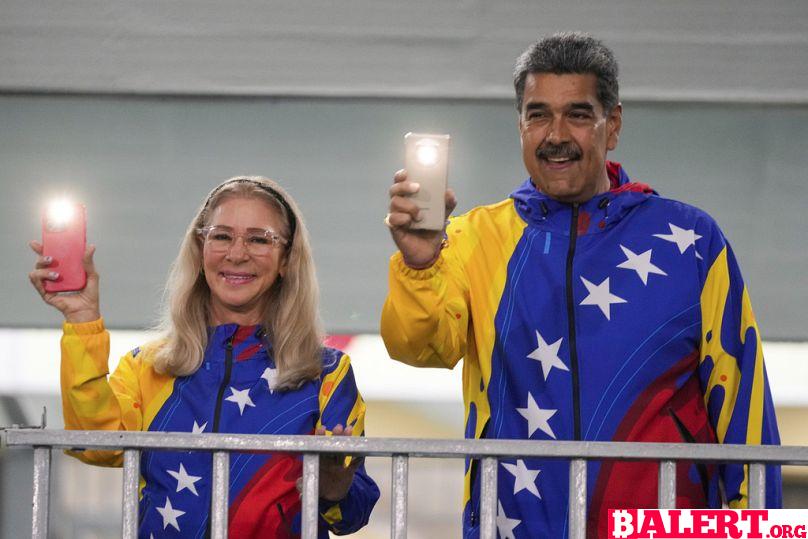World
Maduro Declared Winner in Controversial Venezuelan Presidential Election
In a highly contested election marred by allegations of fraud and voter intimidation, Nicolás Maduro has been declared the winner of Venezuela’s presidential race. Explore the implications of this controversial outcome on the nation’s future and international relations.

Nicolás Maduro has been officially announced as the victor in Venezuela’s recent presidential election, despite the fact that his opponents are gearing up to contest the results. This declaration sets the stage for a critical confrontation that could determine whether the South American nation moves away from a prolonged period of one-party rule.

Shortly after midnight on Sunday, the National Electoral Council, which is heavily influenced by Maduro loyalists, reported that Maduro received 51% of the votes, narrowly defeating the main opposition candidate, Edmundo González, who secured 44%. However, the electoral authority did not immediately disclose the voting results from the 30,000 polling stations across the country, complicating the opposition’s efforts to challenge the outcome. The opposition has claimed to possess data from only 30% of the ballot boxes, raising concerns about transparency.
The opposition’s presidential candidate, Edmundo González, was seen flashing a victory sign as he arrived to cast his vote in Caracas. The considerable delay in announcing the results—six hours after the polls were scheduled to close—suggested intense discussions within the government about how to address the situation, especially after Maduro’s opponents declared early in the evening that they were confident of victory.

Representatives from the opposition reported that their tallies, gathered from party monitors at the polling stations, indicated that González was decisively defeating Maduro. Meanwhile, the head of the electoral council assured that the official voting acts would be released in the hours to come.
As Maduro sought his third term, he faced one of his most formidable challenges yet from an unexpected contender: Edmundo González, a retired diplomat who was relatively unknown to voters before being selected as a last-minute substitute for prominent opposition figure Maria Corina Machado in April.
In a show of solidarity, US Vice President Kamala Harris expressed her support, stating, “The United States stands with the people of Venezuela who expressed their voice in today’s historic presidential election.” Harris emphasized that “the will of the Venezuelan people must be respected,” using the social media platform X (formerly Twitter) to convey her message.
The implications of this election are expected to reverberate throughout the Americas. Both government opponents and supporters have signaled an interest in joining the exodus of 7.7 million Venezuelans who have already fled their homeland in search of better opportunities abroad, should Maduro secure another six-year term.
Despite Maduro’s electoral victory, his government and the United Socialist Party of Venezuela are facing unprecedented unpopularity among the electorate. Many voters hold him accountable for devastating economic policies that have led to plummeting wages, widespread hunger, a crippled oil industry, and family separations due to emigration.
In addition to González, eight other candidates were on the ballot challenging Maduro, but he posed the most significant threat to Maduro’s reign. After casting his vote, Maduro publicly stated that he would acknowledge the election results and urged all other candidates to commit to doing the same. “No one is going to create chaos in Venezuela,” Maduro insisted. “I recognize and will recognize the electoral referee, the official announcements, and I will ensure they are acknowledged.”
Venezuela, which possesses the largest proven oil reserves in the world, once boasted the most advanced economy in Latin America. However, it has plunged into a deep economic crisis since Maduro took power. Plummeting oil prices, rampant shortages, and hyperinflation that has soared past 130,000% have led to social unrest and mass emigration.
Sanctions imposed by the United States, aimed at forcing Maduro from office following his controversial 2018 reelection—which was condemned as illegitimate by the US and numerous other nations—have only exacerbated the crisis.
In this election, Maduro’s campaign focused on the theme of economic security, attempting to persuade voters through narratives of entrepreneurship, stable currency exchange, and reduced inflation rates. Nevertheless, most Venezuelans have not experienced any significant improvement in their living standards, with many families struggling to afford basic necessities.
The opposition has sought to capitalize on the stark inequalities that have arisen from the ongoing crisis, during which the Venezuelan people have largely abandoned their national currency, the bolivar, in favor of the US dollar.
Throughout their campaigning, González and Machado emphasized the need to address the vast economic disparities present in Venezuela’s rural hinterlands, where the economic recovery seen in the capital, Caracas, has not reached. They promised to establish a government that would create sufficient job opportunities to entice Venezuelans living abroad to return home and reunite with their families.
World
Dominique Pelicot Testifies in Harrowing Rape Trial
Join us as Dominique Pelicot courageously testifies in a harrowing rape trial, shedding light on the complexities of trauma and justice. Her powerful story raises crucial questions about the legal system and the importance of support for survivors.

Dominique Pelicot Takes the Stand in Shocking Rape Trial
In a courtroom drama that has captivated France and garnered international attention, Dominique Pelicot, the man at the center of a harrowing rape trial, finally addressed the court. With tears streaming down his face, he recounted how his wife had been instrumental in helping him cope with a tumultuous past marked by trauma. He revealed that he had endured a sexual assault at the tender age of nine while hospitalized, and he also witnessed a gang rape during his teenage years while working as an apprentice electrician on a construction site.
“She didn’t deserve this, I acknowledge that,” Mr. Pelicot stated, his voice barely audible as he struggled to convey his emotions. The gravity of the situation weighed heavily on him, and the courtroom fell silent, straining to catch his every word.
Now 71 years old, Mr. Pelicot faces serious allegations of drugging his wife, Gisèle Pelicot, whom he has been married to for half a century, over a span of nearly ten years. Prosecutors contend that he used drugs to render her comatose, allowing him to rape her repeatedly. Furthermore, authorities allege that he went so far as to invite numerous men into their home, facilitating a nightmarish scenario where they, too, engaged in the assault of his wife.
Overall, 51 men, including Mr. Pelicot, are on trial concurrently, primarily facing charges related to the aggravated rape of Ms. Pelicot. Among them, one individual has already pleaded guilty to similar crimes, admitting to drugging his own wife to assault her and inviting Mr. Pelicot to partake in the horrific act while she was incapacitated.
Mr. Pelicot’s unexpected testimony came after a tumultuous start to the trial. Just a week in, he was stricken with severe health issues that forced him to miss four consecutive days in court. The head judge ultimately decided to postpone proceedings, as Mr. Pelicot was diagnosed with kidney stones, a kidney infection, and prostate complications, adding yet another layer of complexity to this already harrowing case.
World
Meta Bans Russian State Media Outlets from Social Media Platforms
Explore the implications of Meta’s decision to ban Russian state media outlets from its social media platforms. Understand the impact on information dissemination and the ongoing battle against misinformation in the digital landscape.

Meta Imposes Global Ban on Russian State Media Outlets
In a significant move, Meta Platforms, Inc., the parent company of Facebook, has announced the prohibition of Russian state media outlets, including RT (Russia Today) and Rossiya Segodnya, from all its social media platforms. The decision stems from the company’s concerns regarding the deceptive strategies employed by these media organizations to execute covert influence operations across the internet.
Meta made this announcement on Monday, emphasizing that the ban will be enforced worldwide across its various platforms, such as Instagram, WhatsApp, and Threads. The rollout of this ban is expected to take place over the coming days.
Statement from Meta
A spokesperson for Meta elaborated on the decision, stating, “After careful consideration, we have expanded our ongoing enforcement actions against Russian state media outlets. As a result, Rossiya Segodnya, RT, and other affiliated entities are now banned from our applications globally due to their involvement in foreign interference activities.”
For further insights into this development, watch the video in the player above.
World
Trump Recalls Alleged Assassination Attempt While Golfing
Explore Donald Trump’s chilling recollection of an alleged assassination attempt he experienced while enjoying a round of golf. Delve into the tense moments and his reflections on safety, fame, and the unpredictability of public life.

In a recent interview on the social media platform X, Republican presidential nominee Donald Trump recounted a harrowing incident he claims to have experienced while playing golf. Trump described how, during a peaceful Sunday morning round with friends, the tranquility of the day was abruptly shattered by the sound of gunfire in the air.
“It was a beautiful day, everything was just perfect,” Trump reflected. “Then all of a sudden, we heard shots being fired—probably around four or five in total.” He went on to explain that a Secret Service agent was the first to spot the suspect, who was allegedly armed with an AK-47, a powerful assault rifle.
“The agent saw the barrel of the weapon and immediately took action, returning fire at the barrel and aiming in the direction of the bushes,” Trump detailed. “I would have loved to have sunk that last putt, but we decided it was best to leave the scene promptly.”
Trump expressed his gratitude towards the agents and a vigilant civilian who aided in tracking down the suspect, who was eventually apprehended following a high-speed chase.
Suspect Faces Multiple Federal Gun Charges
The FBI has identified the suspect as Ryan Wesley Routh, accusing him of targeting Trump during his time at the golf club in West Palm Beach, Florida. According to an FBI report, Routh had allegedly hidden among the hedges of the golf course for an astonishing 12 hours. Authorities discovered an SKS-style assault rifle, a GoPro camera, and a bag of food at the scene.
The 58-year-old Routh is now facing two serious federal gun charges. If convicted on both counts, he could face a combined maximum sentence of 20 years in prison. Notably, neither of the charges is directly related to an assassination attempt. The first charge pertains to possessing a firearm despite a prior felony conviction, which carries a potential 15-year sentence, a fine of $250,000 (€225,000), and three years of supervised release.
The second charge involves possession of a firearm with an obliterated serial number, which could result in a five-year prison term, the same financial penalties, and also three years of supervised release. As the investigation continues, additional charges could be forthcoming.
While the motive behind Routh’s actions remains unclear, his digital footprint reveals strong political affiliations, particularly concerning issues surrounding Ukraine and China. Routh consistently expressed support for Ukraine across various social media platforms, even claiming to have orchestrated a recruitment scheme for international volunteers aiming to assist Ukraine in its fight against Russia’s invasion. This behavior has been denounced by Ukrainian soldiers and members of the International Legion, who disavowed Routh’s actions and motives.
-

 Business5 months ago
Business5 months agoThe Significance of Jackson Hole: A Central Banking Tradition
-

 Tech4 months ago
Tech4 months agoNew Leaks and Features About the Samsung Galaxy S25 Ultra
-

 Business7 months ago
Business7 months agoObituary: Dan Collins
-

 Article7 months ago
Article7 months agoCreative Design Applications Developed with Artificial Intelligence
-

 Business4 months ago
Business4 months agoBhutan’s Strategic Investment in Bitcoin: A New Era for the Himalayan Kingdom
-

 World4 months ago
World4 months agoThierry Breton Resigns: Impact on European Union Leadership
-

 Gaming4 months ago
Gaming4 months agoNew Details and Trailer Released for Dead Rising Deluxe Remaster
-

 Gaming4 months ago
Gaming4 months agoNew Details for Alan Wake 2 and PlayStation 5 Pro Announcement












